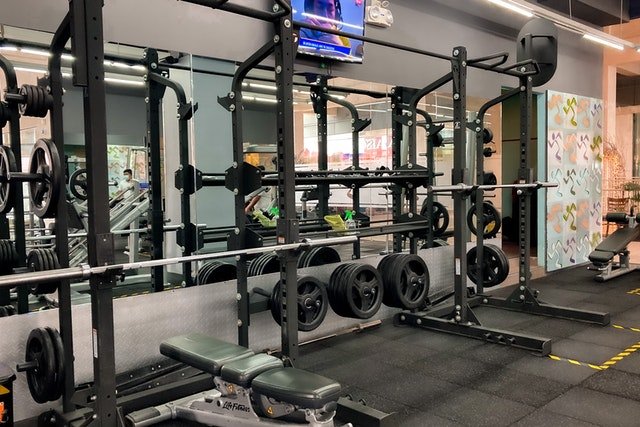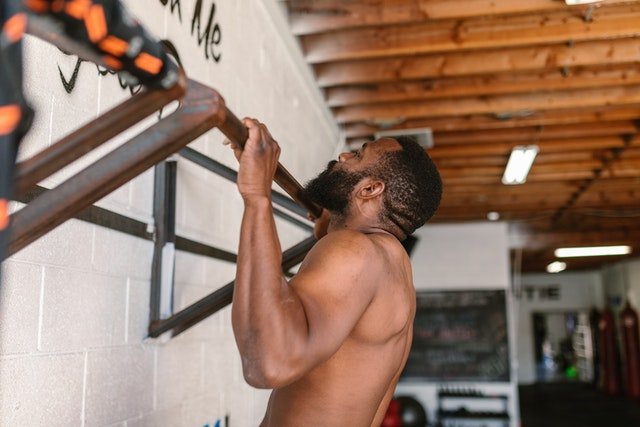Why Is My Bench Press Getting Weaker? (16 Crucial Tips & Hacks To Progress)
Are you working out regularly and finding that your bench press hasn’t just stagnated, but it’s getting worse?
If you’re still struggling to increase your bench press strength, don’t despair – there are several ways to work around the problem. With some patience and perseverance, you can eventually get your bench press back up to where it was before.
It can be hugely frustrating, especially if other parts of the body are seeing progress.
Why Is My Bench Press Getting Weaker?
There are several reasons why your bench press might start to feel weaker as you get more experience in weightlifting. It could be that your form is slipping and you’re not using your muscles as efficiently as you used to. Alternatively, it could be that you’ve been training too hard and you’re overreaching, which can lead to burnout and decreased performance. If you’re worried that your bench press is getting weaker, the first thing to do is check your form. Make sure that you’re using proper technique and engaging all of the muscles in your chest, shoulders, and arms. If your form is good, then it’s time to take a look at your training regimen. If you’re training too hard, you may need to back off a bit and give your body time to recover. You can also try doing more isolation exercises that target the muscles you use in the bench press, such as flyes and triceps extensions. By doing these exercises, you can help to increase your strength and avoid burnout.
1. Its Combination Of Chest, Shoulders, And Triceps
The bench press is a compound exercise, which means that it utilizes multiple muscle groups at the same time.
The primary muscles involved in the bench press are the chest, shoulders, and triceps.
However, other muscles in the arms and back are also used to a certain extent.
2. Change The Order Of Exercises
If you always do the bench press first in your workouts, try changing the order of your exercises.
Doing other exercises first can help to warm up your muscles and get them ready for the bench press. Bear in mind, It can also fatigue your muscles so that you’re not lifting as much weight when you get to the bench press.
If you’re not sure what order to do your exercises in, consult with a qualified trainer or coach, who will set you up with a training program.
If you are struggling to see strength gains in your bench press, don’t give up – there are ways to work around the problem.

3. Sufficient Recovery
One of the most important things to remember when trying to increase your strength is to allow your body to recover properly.
If you’re training too often or not giving yourself enough time to rest, your muscles will never have a chance to repair and grow. Make sure that you’re giving yourself at least one day of rest per week, and more if you feel like you need it.
Your muscle fibers need time to repair themselves after being broken down during workouts.
4. The Importance Of Your Diet
In addition, make sure that you’re eating enough food to support your training. Eating a nutritious diet will give your body the energy it needs to recover from workouts and grow stronger.
Most people that are serious about increasing their strength, follow a structured training and nutritional program.
If you’re not sure how much food you should be eating, speak to a registered dietitian or nutritionist. They can help you to create a meal plan that will support your training and help you to reach your goals.
Related: Can Kettlebell Swings Replace Squats? (12 Vital Things To Consider)
5. Is Your Form Slipping?
It’s so important to use proper form when you’re bench pressing. If your form is off, you could be putting undue stress on your muscles and joints, which could lead to injury.
When bench pressing, there are several things to implement, you should focus on squeezing your chest muscles while keeping your shoulders down and back.
This will help to engage all of the muscles in your chest and avoid injury. You should also keep your elbows close to your body to ensure that you’re using your triceps muscles.
If you find that your bench press is getting weaker, it’s important to check your form and make sure that you’re using all of the muscles in your chest, shoulders, and arms.
Have your feet firmly planted on the floor and squeeze your glutes to stabilize your body.
When you lower the bar, aim for the middle of your chest and tuck your chin to ensure that you have a good line of sight.
Once you’ve reached the bottom of the lift, press the bar back up to the starting position and repeat.
Your shoulder blades should be squeezed together at the top of the lift and the bar should be lowered to the nipple line, if it’s lowered higher it will be putting extra strain on your front deltoids and back muscles.
Practice this lift with lighter weights first to ensure that you have good technique before attempting to lift heavier weights.
6. Cheating With Exercise
Make sure you aren’t cheating yourself out of hard gains by bouncing the bar off your chest.
This is a common mistake people make on chest day, especially when trying to increase their training volume.
Having a good bench press technique will help you to focus on using your chest muscles and avoid any temptation to cheat.
Bouncing the bar off your chest puts unnecessary stress on your joints and connective tissues, which could lead to injury.
It also takes the tension away from your chest muscles, which means that you’re not working them as hard as you could be.
If you find that you’re struggling to keep the bar under control, lower the weight and focus on using a slower, more controlled tempo.
You should also focus on using a full range of motion, which means lowering the bar to your chest and pressing it back up until your arms are fully extended.
7. Mental Hurdle
Sometimes, the reason why your bench press is getting weaker is because of a mental hurdle.
If you’ve been lifting for a while, it’s possible that you’ve become too comfortable with the weight that you’re lifting and your muscles have stopped growing.
To see strength gains, you need to continuously challenge your muscles by lifting heavier weights.
If you find that you’re no longer seeing gains in your bench press, it may be time to increase the weight if you have a weak bench press.
Start with small increments and focus on using proper form.
As you get stronger, you’ll be able to lift more weight and continue to see gains in your bench press.

8. What Are You Working Out The Previous Day?
If you find that your bench press is getting weaker and you’re struggling to see gains, it’s important to take a look at your training schedule.
If you’re working out your shoulders (press etc) or triceps (skull crushers etc) the day before, this could be the reason why your bench press is getting weaker.
When you work out these muscles, they tend to be tired the next day, which could affect your performance on the bench press.
It’s important to have at least one day of rest between workouts to ensure that your muscles have time to recover.
9. Need To Mix Up Routine?
If you’ve been doing the same workout routine for a while, your body may have adapted to the exercises and weights that you’re using.
To see continued gains, it’s important to mix up your routine and challenge your muscles in different ways.
This doesn’t mean that you need to completely change your workout routine, but you may need to add some new exercises or increase the weight that you’re lifting.
You can also try different variations of the bench press, such as close grip or decline, to target different muscles.
By mixing up your routine, you can avoid plateaus and continue to see gains in your bench press.
If you’re struggling to see gains in your bench press, it may be time to take a step back and reassess your approach.
Maybe even consider doing some bodyweight push ups to build your strength back up, this can be the standard type or even on your knees if normal ones are too challenging.
Related: Is Progressive Overload Important On A Calorie Deficit? (4 Things To Achieve Maximum Overload)
10. Have You Been Ill Recently?
If you’ve been ill or injured recently, this could be the reason why your bench press is getting weaker.
It’s important to listen to your body and give yourself time to recover before trying to lift heavy weights again.
If you’re not fully recovered, you could risk further injury, which could set you back even more.
It’s important to be patient and focus on gradual gains rather than trying to lift heavy weights too soon.
Focus on body weight or strength training exercises until you’re feeling better before trying to increase the weight on your bench press.
11. Are Weak Muscles To Blame?
If your bench press is getting weaker, it could be because of weak muscles.
As mentioned previously, several muscles contribute to the bench press, including the chest, shoulders, and triceps.
If any of these muscles are weak, it could affect your performance on the bench press.
One way to determine if you have weak muscles is to see if you can still perform the exercise with good form when the weight is lighter.
If you find that your form starts to break down when you lower the weight, it’s an indication that your muscles are weak.
In this case, you may need to focus on working these muscles separately with exercises such as chest presses or shoulder presses.
12. Get A Spotter
If you’re bench pressing heavy weights, it’s always a good idea to have a spotter.
A spotter can help you to lift the weights safely and prevent injuries. They can also help you to push through tough workouts and reach new PRs.
If you don’t have a spotter, you may want to consider working out with a friend or training partner who can help you to lift the weights safely.

13. Genetics
Genetics plays a role in how much weight you can lift.
If you have smaller muscles or a thinner frame, you may not be able to lift as much weight as someone who is bigger or has more muscle mass.
This doesn’t mean that you can’t make gains, it just means that you may need to focus on other aspects of your training, such as increasing the reps or sets that you’re doing, or increasing the weight gradually over time.
If you’re struggling to increase the weight on your bench press, it may be time to reassess your goals and focus on other areas of your training.
14. Grip Issues?
Your grip can also affect your bench press.
If you have a narrow grip, it will target your triceps more than your chest.
If you have a wide grip, it will target your chest more than your triceps.
You may need to experiment with different grips to find what works best for you.
Some specialty bars can help you to focus on specific muscles, such as the cambered bar or the Swiss bar.
These bars can help you to target weak muscles and bring up your bench press.
15. How Is Your Back Arch?
Your back arch can also affect your bench press.
If you have a big arch in your lower back, it will put your shoulders in a more vulnerable position and make it harder to press the weight.
On the other hand, if you have too much of an arch in your upper back, it can put a strain on your shoulder joints.
The best way to find the right back arch is to experiment and see what feels comfortable and gives you the best range of motion.
16. Change The Way You Do Exercise
Changing how you perform the bench press can increase muscle fiber stimulation, by slowing down the eccentric (lowering) portion of the lift.
This will help to break through any strength plateaus you may be experiencing and slower reps will help to increase time under tension and stimulate more muscle growth to help you continue making gains.
Also, consider doing the exercise faster than usual, faster reps will help to improve your power and explosiveness.
Plyometric exercises, such as clapping pushups or medicine ball throws, can also help to improve power and explosiveness.
You may also want to try using a different bench press variation, such as the close-grip bench press or the incline bench press.
Both of these exercises can help to target different muscles and add variety to your workout routine.
It’s also important to focus on using a full range of motion when you’re bench pressing.
Partial reps won’t stimulate all the muscle fibers and can lead to imbalances.
Final Thoughts…
If you’re struggling to increase the weight on your bench press, there are several things you can do to work around it.
First, check your form and make sure you’re using a full range of motion. Second, focus on working other muscle groups, such as your triceps or shoulders.
You may also want to try using a different grip or bench press variation.
Remember, genetics also play a role in how much weight you can lift, so don’t get discouraged – focus on your progress and keep working hard!
If you enjoy sport and use CBD to help with your recovery in between gruelling workouts, then you are in the right place. Here at Sport CBDs, we train hard and recover the best way possible…
We have regular workouts (check out the YouTube channel), CBD news and CBD products to help you gain that edge!
If you wanted to check out the reputable CBD we have on offer here at the site, then please head to the Sport CBDs Store (CLICK HERE). We also do fitness clothing and yoga accessories too.
Until next time, all the best…


